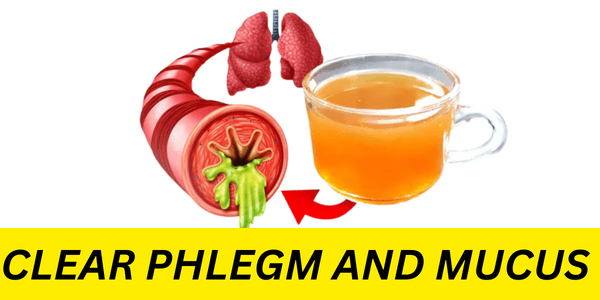Dealing with stubborn phlegm in the lungs can be an uncomfortable and frustrating experience. Many individuals resort to over-the-counter medications in search of relief, only to find limited results and potential side effects. In this article, we will explore alternative approaches to address phlegm naturally, without the use of suppressant medications. By incorporating simple yet potent ingredients, you can effectively combat phlegm while promoting respiratory health. Additionally, we will discuss the importance of exercise and specific dietary additions to support your body in eliminating trapped mucus.
Understanding Common Treatments for Phlegm:
Conventional treatments for phlegm generally fall into two categories: mucus suppressants and expectorants. While suppressants temporarily alleviate cough and mucus production, they can prolong the duration of infection and weaken the immune system. Furthermore, suppressants may lead to mild complications like vomiting, nausea, diarrhea, constipation, and even kidney stones. On the other hand, expectorants aim to expel mucus from the lungs, but FDA-approved options are limited. It is advisable to explore natural remedies to address phlegm effectively while minimizing potential side effects.
How to Clear Phlegm in the Lungs Naturally:
In addition to focusing on natural remedies, incorporating certain practices into your routine can help alleviate respiratory congestion. Deep breathing exercises that alternate between chest and stomach breathing can mobilize mucus, providing relief from trapped phlegm. Furthermore, consuming radishes can aid in the expulsion of mucus from deep tissues within the body.
The Powerful Trio: Onion, Honey, and Lemon:
A highly effective natural remedy for phlegm in the lungs involves the use of three simple ingredients: onion, honey, and lemon.
Onions possess natural properties that help thin mucus, making them effective mucous expectorants. They contain sulfur, which aids in breaking down mucus and are also rich in quercetin—a natural antihistamine that helps reduce inflammation and soothe an overactive immune system. To utilize onion juice, grate an onion and strain the juice using a paper towel or a strainer. One tablespoon (14.7 milliliters) of onion juice is sufficient for this remedy.
Honey, especially raw honey like Manuka honey, is renowned for its cough-suppressing properties and ability to act as a natural expectorant. It possesses antimicrobial and anti-inflammatory properties, making it a valuable addition to this remedy. If Manuka honey is not available, any raw honey will suffice. Honey also contains naturally occurring hydrogen peroxide, which helps combat pathogens. Add one tablespoon (14.7 milliliters) of honey to the mixture.
Lemon juice, with its citric acid and vitamin C content, serves to break up mucus and boost the immune system. Its sour taste aids in thinning mucus, facilitating its removal from the body. Two tablespoons (29.4 milliliters) of lemon juice should be added to the mixture.
To prepare this natural remedy, combine the onion juice, honey, and lemon juice in a cup of water. Drink this mixture three times a day for optimal results. If desired, you can also add a tablespoon of apple cider vinegar and ginger to enhance the remedy’s effectiveness.
Conclusion:
Persistent phlegm in the lungs can be effectively addressed through natural remedies and lifestyle modifications. By utilizing the powerful trio of onion, honey, and lemon, you can harness the natural expectorant and antimicrobial properties of these ingredients. Alongside this remedy, practicing deep breathing exercises and incorporating radishes into your diet can further aid in clearing phlegm. Embracing these natural strategies not only relieves respiratory congestion but also supports overall respiratory health. Remember, a holistic approach can often provide effective relief without the side effects associated with conventional treatments.
